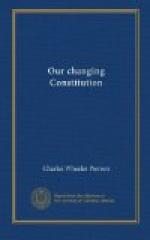The powers of the legislature are defined and limited; and that those limits may not be mistaken or forgotten, the Constitution is written. To what purpose are powers limited, and to what purpose is that limitation committed to writing, if these limits may, at any time, be passed by those intended to be restrained?... The Constitution is either a superior paramount law, unchangeable by ordinary means, or it is on a level with ordinary legislative acts, and, like other acts, is alterable when the legislature shall please to alter it. If the former part of the alternative be true, then a legislative act, contrary to the Constitution, is not law: if the latter part be true, then written constitutions are absurd attempts, on the part of the people, to limit a power in its own nature illimitable.
[Footnote 1: Marbury v. Madison, 1 Cranch, 176.]
It would seem at first blush that the power in the Court to declare legislative acts unconstitutional affords a complete safeguard against congressional encroachment on the prerogatives of the states. Such is not the fact, however. The veto power of the Court by no means covers the entire field of legislative activity. In the Convention which framed the Constitution, attempts were made to give to the judiciary, in conjunction with the executive, complete power of revision over legislative acts, but all such propositions were voted down.[1] As matters stand, there may be violations of the Constitution by Congress (or for that matter by the executive) of which the Court can take no cognizance.
[Footnote 1: See e.g., Farrand: “Records of the Federal Convention,” Vol. I, pp. 138 et seq.; Vol. II, p. 298.]
For one thing, the Court cannot deal with questions of a political character. The function of the Court is judicial only. Upon this ground it was decided that the question which of two rival governments in the State of Rhode Island was the legitimate one was for the determination of the political department of government rather than the courts;[1] that the question, whether the adoption by a state of the initiative and referendum violated the provision of the Federal Constitution guaranteeing to every state a republican form of government, was political and therefore beyond the jurisdiction of the Court.[2] In 1867 a sovereign state sought to enjoin the President of the United States from enforcing an act of Congress alleged to be unconstitutional. The Supreme Court, without determining the constitutionality of the act, declined to interfere with the exercise of the President’s political discretion.[3] In the famous Dred Scott case[4] the effort of the Supreme Court to settle a political question accomplished nothing save to impair the influence and prestige of the Court.
[Footnote 1: Luther v. Borden, 7 Howard, 1.]
[Footnote 2: Pacific Telephone Co. v. Oregon, 223 U.S., 118.]




